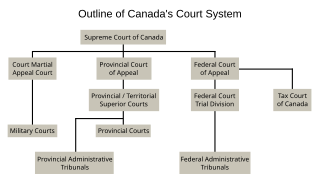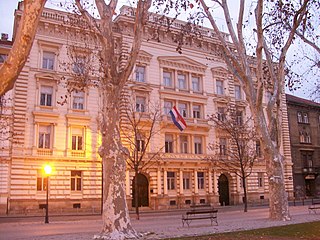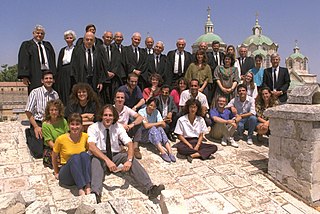
A judge is a person who presides over court proceedings, either alone or as a part of a panel of judges. The powers, functions, method of appointment, discipline, and training of judges vary widely across different jurisdictions. The judge is supposed to conduct the trial impartially and, typically, in an open court. The judge hears all the witnesses and any other evidence presented by the barristers of the case, assesses the credibility and arguments of the parties, and then issues a ruling on the matter at hand based on his or her interpretation of the law and his or her own personal judgment. In some jurisdictions, the judge's powers may be shared with a jury. In inquisitorial systems of criminal investigation, a judge might also be an examining magistrate.

The Court of Cassation is one of the four courts of last resort in France. It has jurisdiction over all civil and criminal matters triable in the judicial system, and is the supreme court of appeal in these cases. It has jurisdiction to review the law, and to certify questions of law, to determine miscarriages of justice. The Court is located in the Palace of Justice in Paris.

The Chief Justice of Canada is the presiding judge of the nine-member Supreme Court of Canada, the highest judicial body in Canada. As such, the chief justice is the highest-ranking judge of the Canadian court system. The Supreme Court Act grants plenary power to the Governor General to appoint—with the advice of the Prime Minister—a chief justice, who serves until they resign, die, are removed from office for cause, or attain the age of 75 years. By tradition, a new chief justice is chosen from among the Court's incumbent puisne justices.

The United States Court of Appeals for the Armed Forces is an Article I court that exercises worldwide appellate jurisdiction over members of the United States Armed Forces on active duty and other persons subject to the Uniform Code of Military Justice. The court is composed of five civilian judges appointed for 15-year terms by the President of the United States with the advice and consent of the United States Senate. The court reviews decisions from the intermediate appellate courts of the services: the Army Court of Criminal Appeals, the Navy-Marine Corps Court of Criminal Appeals, the Coast Guard Court of Criminal Appeals, and the Air Force Court of Criminal Appeals.
Claire L'Heureux-Dubé, served as a puisne justice on the Supreme Court of Canada from 1987 to 2002. She was the first woman from Quebec and the second woman appointed to this position, after Bertha Wilson. Previously, she had been one of the first woman lawyers to handle divorce cases, and was the first woman appointed as a judge to the Quebec Superior Court and the Quebec Court of Appeal.

The court system of Canada forms the judicial branch of government, formally known as "The Queen on the Bench", which interprets the law and is made up of many courts differing in levels of legal superiority and separated by jurisdiction. Some of the courts are federal in nature, while others are provincial or territorial.
In Canadian law, a reference question or reference case is a submission by the federal or a provincial government to the courts asking for an advisory opinion on a major legal issue. Typically the question concerns the constitutionality of legislation.

The District of Columbia Court of Appeals is the highest court of the District of Columbia. Established in 1970, it is equivalent to a state supreme court, except that its authority is derived from the United States Congress rather than from the inherent sovereignty of the states. The court is located in the former District of Columbia City Hall building at Judiciary Square. The D.C. Court of Appeals should not be confused with the District's federal appellate court, the United States Court of Appeals for the District of Columbia Circuit. The D.C. Court of Appeals and the Superior Court of the District of Columbia comprise the District's local court system.

The Supreme Court of the Republic of Croatia is the highest court in the country, which ensures the uniform application of laws and equal justice to all.

A law clerk or a judicial clerk is an individual—generally an attorney—who provides direct assistance and counsel to a judge in making legal determinations and in writing opinions by researching issues before the court. Judicial clerks often play significant roles in the formation of case law through their influence upon judges' decisions. Judicial clerks should not be confused with legal clerks, court clerks, or courtroom deputies who only provide secretarial and administrative support to attorneys and/or judges.

The Supreme Court of British Columbia (BCSC) is the superior trial court for the province of British Columbia, Canada. The BCSC hears civil and criminal law cases as well as appeals from the Provincial Court of British Columbia. There are 90 judicial positions on the BCSC bench in addition to supernumary judges, making for a grant total of 108 judges. There are also 13 Supreme Court masters who hear and dispose of a wide variety of applications in chambers.

Priscilla Richman Owen is a United States Circuit Judge of the United States Court of Appeals for the Fifth Circuit. She was previously a Justice of the Texas Supreme Court.

The judicial system of Israel consists of secular courts and religious courts. The law courts constitute a separate and independent unit of Israel's Ministry of Justice. The system is headed by the President of the Supreme Court and the Minister of Justice.

Barbara Milano Keenan is a United States Circuit Judge of United States Court of Appeals for the Fourth Circuit and a former justice on the Supreme Court of Virginia.
Justice Elizabeth Bennett is judge of the British Columbia Court of Appeal. During her term on the Supreme Court of British Columbia, she presided over two notable corruption trials.
Patricia Ann Millett is a United States Circuit Judge of the United States Court of Appeals for the District of Columbia Circuit. She formerly headed the Supreme Court practice at the law firm Akin Gump Strauss Hauer & Feld. Millett also was a longtime former assistant to the United States Solicitor General and served as an occasional blogger for SCOTUSblog. At the time of her confirmation to the D.C. Circuit, she had argued 32 cases before the United States Supreme Court. In February 2016 The New York Times identified her as a potential nominee to replace Justice Antonin Scalia.

The Judicial Service Commission (JSC) of Kenya is established under Article 171 of the Constitution of Kenya. The commission has 11 members with the initial team appointed in December 2010.

National Judicial Council or DSV is an autonomous and independent body that ensures the autonomy and independence of the judicial branch in the Republic of Croatia by autonomously deciding on the appointment, promotion, transfer, dismissal and disciplinary accountability of judges and presiding judges.

Amy Coney Barrett is a United States Circuit Judge of the United States Court of Appeals for the Seventh Circuit. She was previously a professor of law at Notre Dame Law School and the John M. Olin Fellow in Law at George Washington University Law School.

















